Typically, ants don’t consume healthy plants, or undamaged plants, even if it’s possible in some cases.
Fire ants, especially, have been observed feeding on potato tubers, while the most common garden ants usually favor other sources of food.
These ants are actually very beneficial for the garden and for potato plants as they help to control pests and to decompose organic waste.
All in all, whether ant invasions are more advantageous or a disadvantage for your potato plants will depend on the specific conditions of your garden.
You might want to get rid of them in some instances as Red Ants, in particular, can be a real nuisance.
Diatomaceous Earth and borax are some of the lethal methods to achieve this, while there are also harmless ones that simply aim to keep ants away, such as repellant plants or spices.
Finally, one of the best ways to get rid of ant populations is to target aphids, which in most cases are what attracts ants to your potato plants.
- Related article: Ants on Indoor Plants
Are Ants on Potato Plants a Problem?
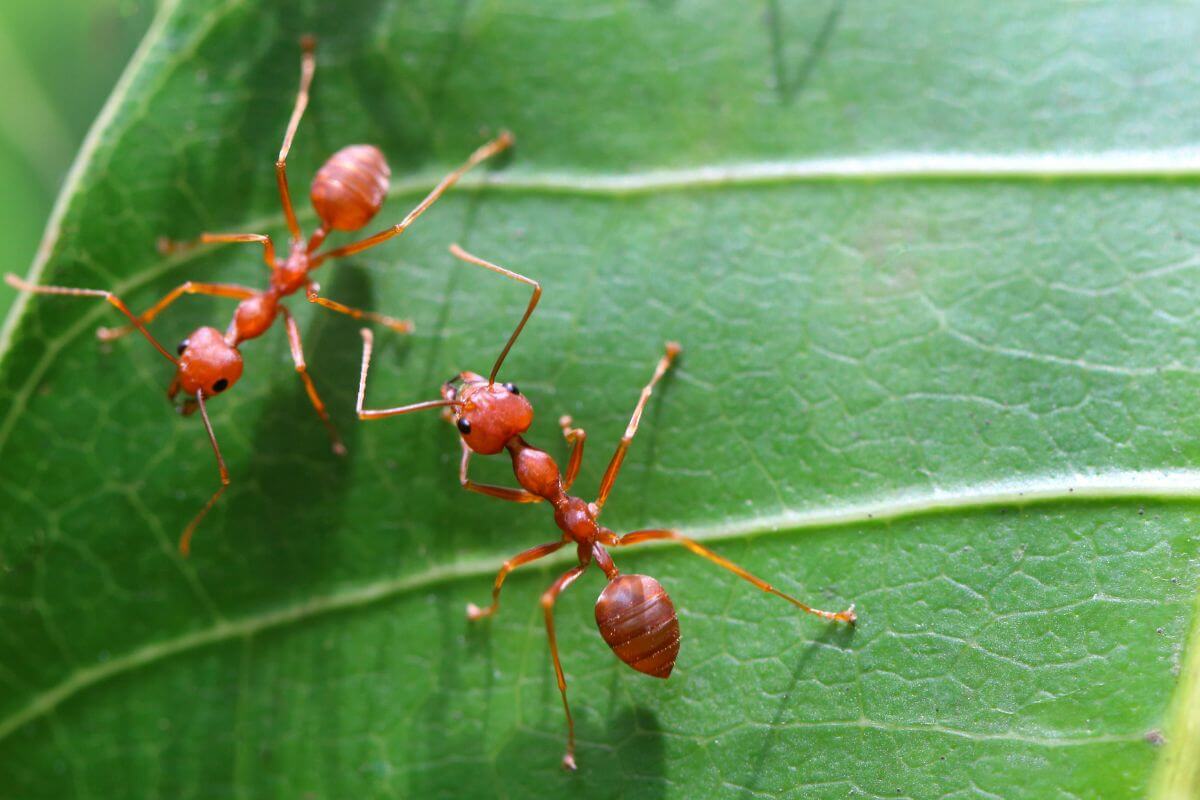
In general, ants are considered beneficial for the garden. However, the exceptions are fire ants and red ants that are known to eat plant greens, as well as fruits and vegetables.
These ants also feed from potatoes on occasion, even if they will ignore these tubers if tastier options are available.
The problem with fire ants is that they will sting you while you try to work on your plants. While usually not dangerous, their sting burns quite a bit and can last for days.
Most times, the presence of ants is a sure sign of an aphid infestation. Ants and aphids have developed a symbiotic mutualistic relationship, where the ants feed from the waste products produced by aphids, and they, in exchange, get protection from predators.
Therefore, ants will quickly follow if your potato plants have been colonized by aphids, and they will help their population to thrive and infest more and more plants.
This is the main problem caused by black ants since by themselves, they don’t cause any damage.
Aphids on plants, on the other hand, feed by sucking the sap from the leaves of your plants, weakening it in the process.
In fact, they consume so much sap that they can’t digest all of the sugar it contains. That’s why their excretions, a sticky substance called honeydew, are so sweet that they attract ants.
As a result of an aphid infestation, the plants suffer and have difficulty growing and photosynthesizing. Moreover, aphids can also spread diseases.
Will Ants Eat Potato Plants?
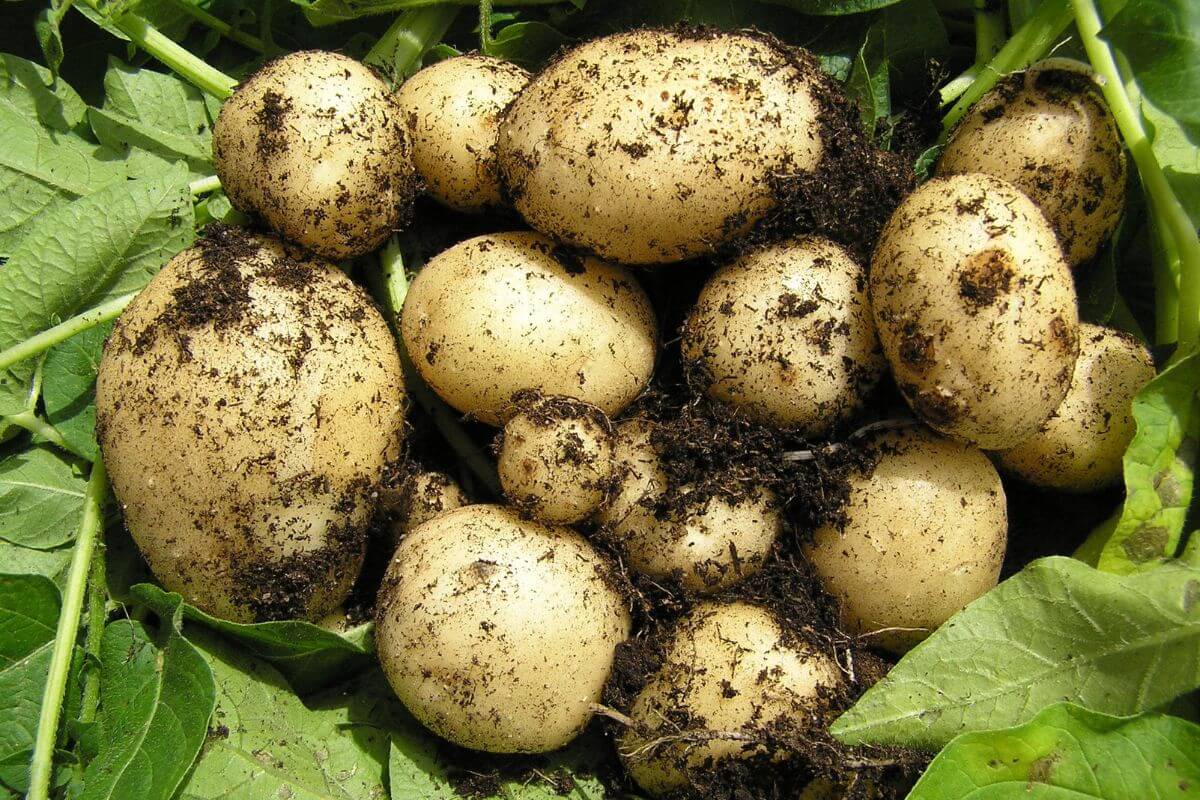
Ants don’t normally eat potato plants as they prefer other food, such as the honeydew produced by aphids.
If you see munched plants, usually the damage cannot be blamed on ants, even if they are crawling all over your plants.
It’s much more likely that cutworms, armyworms, or other leaf-eating caterpillars have attacked the potato plant. These worms are in the larval stage of butterflies and moths. If you notice them, you can simply pick them off the plant and squish them.
For even bigger infestations, you can spray them with Bacillus thuringiensis, a bacterium that is toxic to these insects.
Slugs, snails, and flea beetles might also chew on potato leaves, which leads to bigger crop destruction.
Once the damage has been done, ants might be attracted to the potato plant to feed on any rotten or dead parts, which they will take away to their nest. That could be a reason for the misconception that ants love to eat potato plants.
Fire ants are a different matter, though. These ants have been known to attack potato plants and can even damage them considerably if their population grows too much.
They mostly concentrate their efforts on the tubers, but also on the young shoots.
How Can Ants Help Potato Plants?
Ants can be beneficial to potato plants, as they don’t only feed on the honeydew produced by aphids, but also on other insects and on organic waste.
Here are the main benefits of ants for the garden:
1. Ants Eat Pests
Ants feed on the eggs and larvae of many pests. Their presence in your garden can help you to control the populations of insects and other animals that feed on potato leaves, such as cutworms, armyworms, snails, and slugs.
Without them, these animals would cause even more damage to your potato plants.
2. Ants Decompose Waste Material
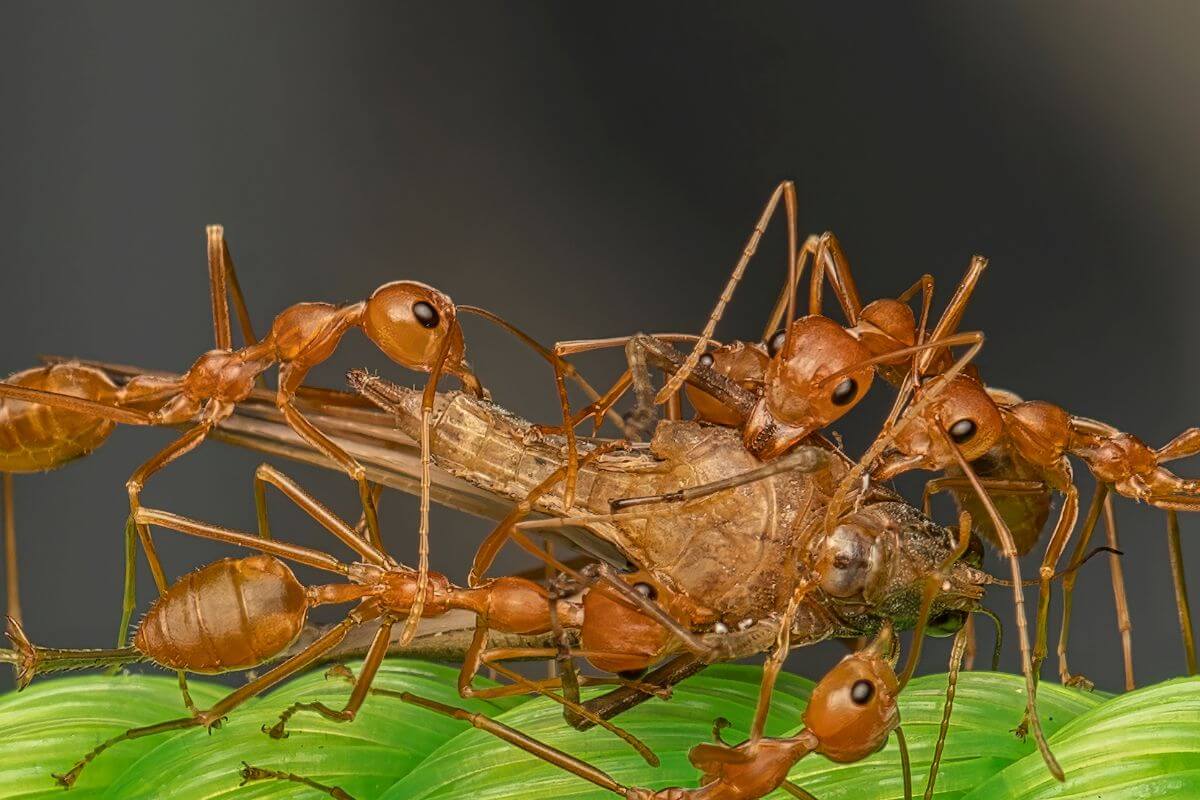
Ants are excellent decomposers, as they remove any dead insect, dead plants or animal to carry to their ant mounds and share with the colony.
In this way, they start off the decomposition process, enabling microorganisms to break down organic matter to its smallest components.
To understand the importance of this process, without ants, dead and rotting materials would accumulate in your garden. In the long run, the soil would lose its fertility as there wouldn’t be any way for nutrients to get back to it.
Of course, ants are not the only insect that carries out this important function, but they are certainly a vital part of the process.
- Related: Are Ants Bad for a Garden?
3. Ants Improve the Soil
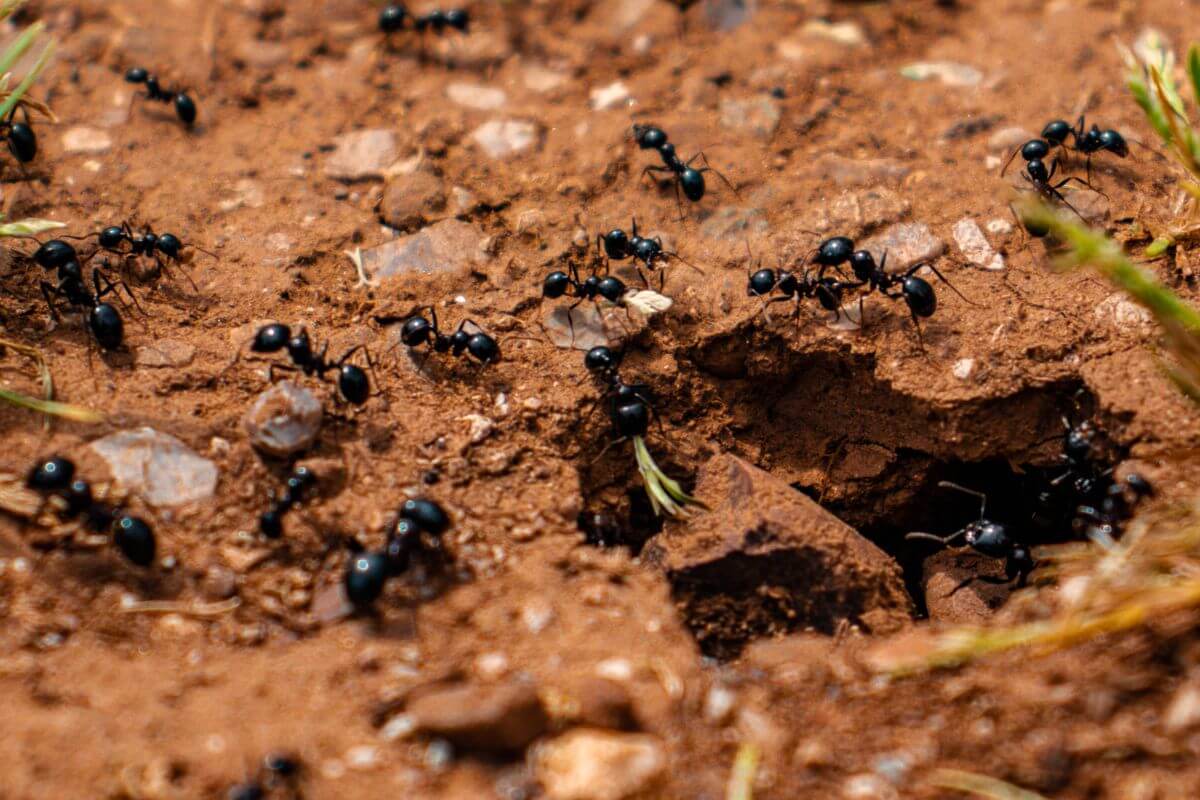
Ants inadvertently improve the quality of the soil as they build their nests. This is because they dig a vast system of galleries, which has the effect of allowing air and moisture to spread more efficiently throughout the soil.
For your potato plants, this means that they will have better access to oxygen and water, which they need to thrive.
Best Ways to Keep Ants Away from Potato Plants
There are many ways of keeping the entire colony of ants away from potato plants without harming your vegetables or other beneficial insects.
There are, of course, synthetic pesticides that are very efficient in killing ants, but we won’t cover them here, as they can be extremely detrimental to the health of the garden and the environment in general.
Also, ant infestations are mostly useful as they are beneficial insects themselves, except for fire ants, so most times it’s best to simply repel them from your plants.
If you really want to kill them off, there are effective methods without making use of dangerous substances.
Beware of so-called natural homemade methods, as they can sometimes have harsh chemical products and as much a negative effect on the balance of the ecosystem as synthetics.
For example, many people suggest using dish soap or peppermint essential oil as a homemade solution, but these can be harmful to the soil, plants, and animals.
Finally, ants can be kept away by getting rid of aphids, as they most often go to aphid-infested plants.
1. Repel Ants
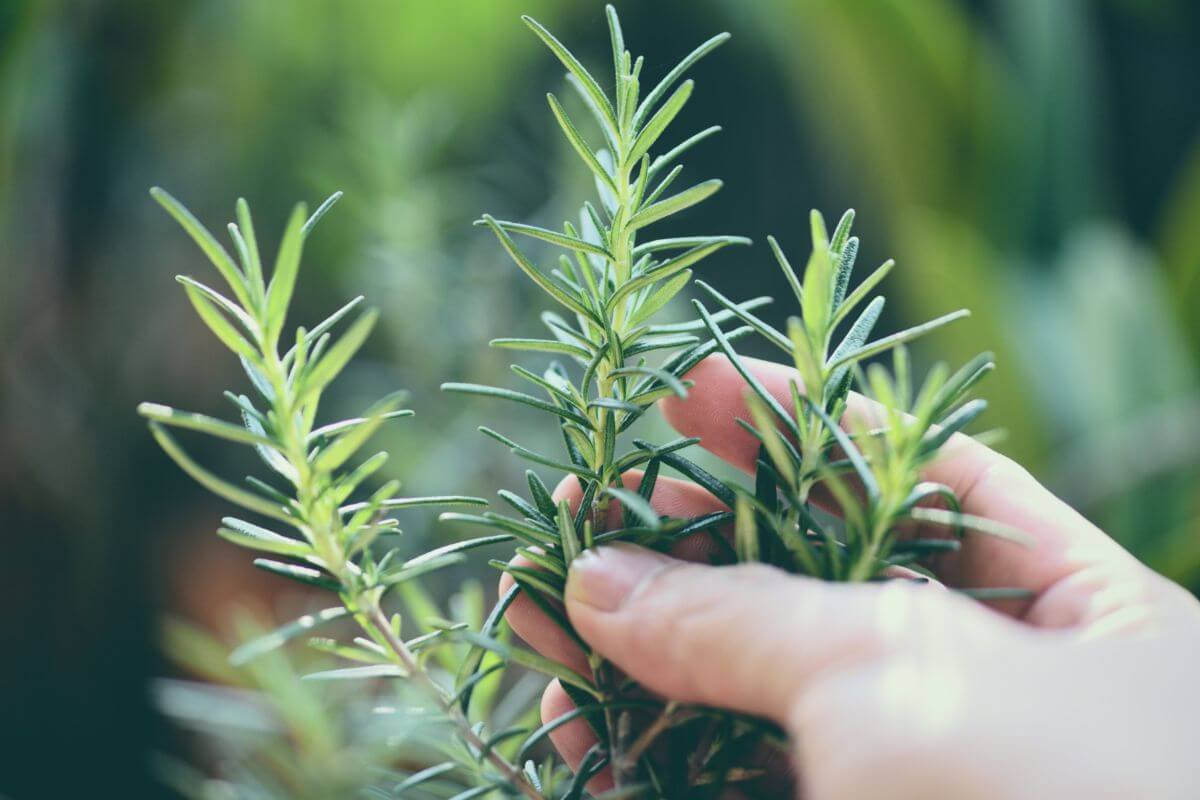
Ants have a very strong sense of smell, so they dislike many intense odors that we find pleasant.
You can plant species around your garden that do not only deter ants but will also increase its diversity and attract pollinators and other beneficial insects.
Peppermint, Rosemary, Thyme, Lavender, Tansy, Pennyroyal, the Common Yarrow, and Garlic are some plants you can use to repel ants.
You can also sprinkle spices such as ground cinnamon, curry, or pepper around your potato plants or your garden as an alternative.
Of course, these powders will be easily washed away in the rain so they will need to be reapplied often for them to be effective.
Read more about Plants That Repel Ants.
2. Use Water
Ants need dry soil to build their nests, so keeping it moist is sometimes enough to avoid them using your garden as their home.
If it’s already too late, pouring boiling water on their nest kills them, at zero cost for you and the environment.
To temporarily get rid of ants crawling on your plants, spray them with a garden hose. This also works to dislodge aphids which, unlike ants, don’t move very quickly and they will die before they are able to get back to their food.
3. Kill Aphids
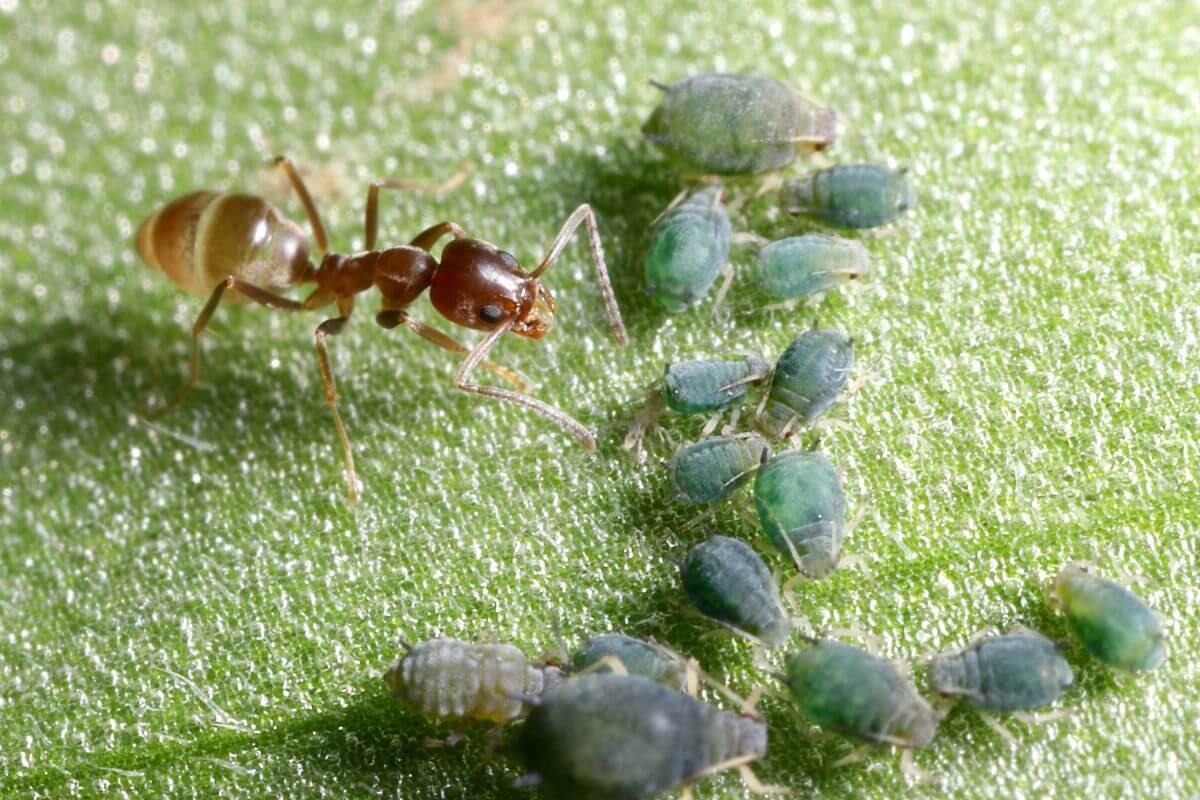
If you notice aphids on the underside of the leaves of your potato plants, you will want to get rid of them as soon as possible. Ants are attracted to aphids, so without these tiny insects, there won’t be any ants.
You can spray aphids with insecticidal soap or horticultural oils, such as neem oil.
These work only on the aphids they get in contact with directly, so you will need to apply them carefully and more than once. They are studied to be perfectly safe, even for edible plants.
Introducing the natural predators of aphids, such as ladybugs, green lacewings, and parasitic wasps is another way of controlling them. These insects love to feed on aphids, as well as many other pests that might infest your garden.
4. Bait Ants
Another proven method to kill the entire ant colony is to make ant bait using a substance called borax mixed with sugar to attract a great number of ants.
Borax is extremely toxic to ants, but they won’t be able to smell it because of the sugar. This way, they will share it with the rest of the colony, killing them all.
Borax is very effective, but it’s also slightly toxic to small animals, including children. Be careful of when, where, and how much you apply.
5. Diatomaceous Earth (DE)
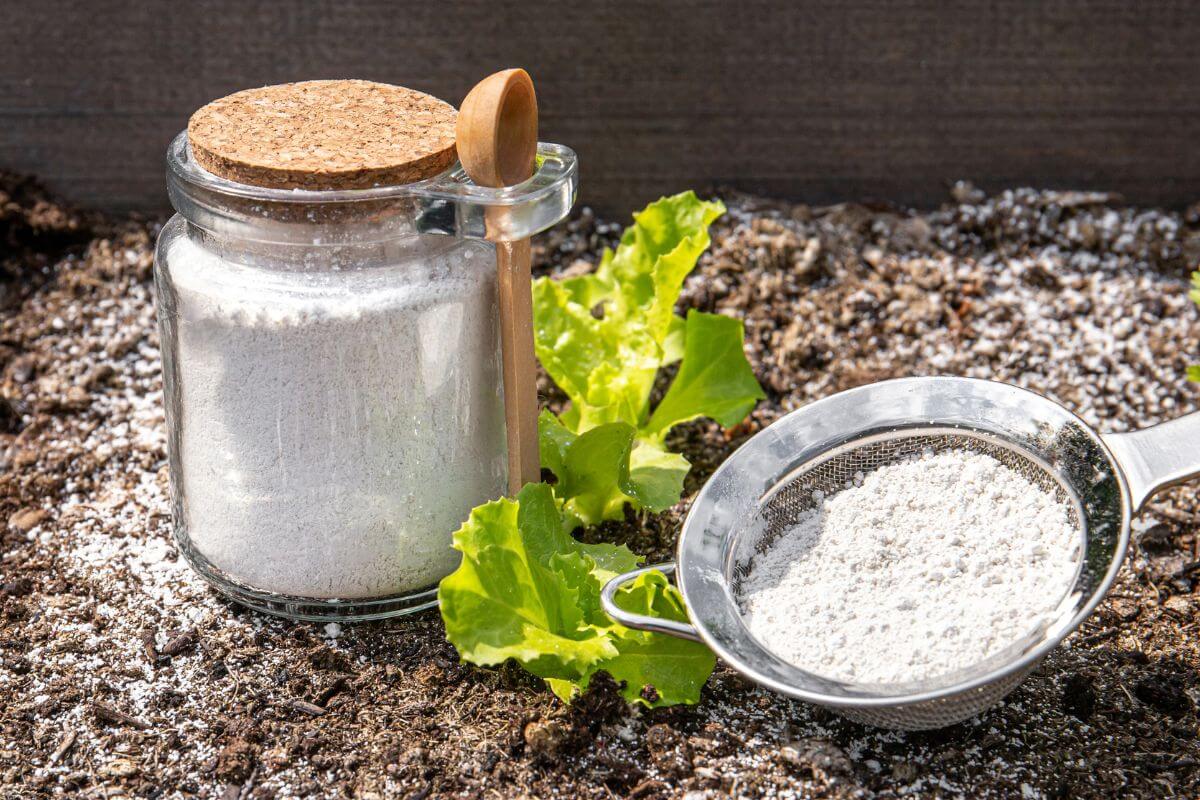
Diatomaceous earth is natural, fine powder obtained from the ground shells of fossilized algae.
Even though DE is natural and organic, it doesn’t mean that it’s completely without downsides as it can also affect beneficial insects.
Fortunately, it doesn’t have any other adverse effects. DE can be sprinkled next to the ant nest, along their trails, or around your potato plants to create a barrier.
Ants on Potato Plants Final Thoughts
The presence of ants in your vegetable garden can have both positive and negative effects, making them an essential part of the natural environment.
Their tendency to farm and protect aphids can harm the plants, even though they play a role in protecting potato plants from pests.
It is important to understand the complex relationships between ants, potato plants, and other organisms in the ecosystem to effectively manage pests without causing unintended harm.
By recognizing the important role that ants play in the environment, we can work towards developing sustainable agricultural practices that maintain healthy ecosystems and support the growth of our vegetable crops!
Learn more about ants and other plants in these articles:
- Ants on Sunflower Leaves
- Ants on Corn Stalks
- Ants on Artichoke Plants
- Ants on Green Bean Plants
- Are Ants on Pepper Plants Bad
Sources:

